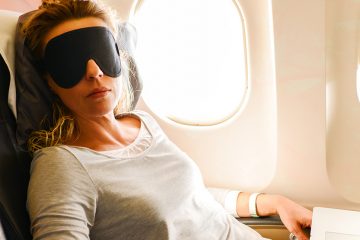Start or End Your Trip Well-Rested
I’ll never forget taking an overnight flight from the United Kingdom to Tbilisi, Georgia the night before Ireland played Georgia in the FIFA World Cup.
I thought I was going to be able to get some sleep on the plane. What a fool I was.
The young, drunk Irish football fans sitting behind us kept everyone up all night with songs, chants and loud banter (despite multiple warnings from airline staff.) I tried to block them out with earplugs to no avail. I arrived in Tbilisi bleary eyed and exhausted.
Hopefully, your next overnight flight isn’t filled with gregarious lads in green singing at the top of their lungs (or crying babies, or a seatmate with a persistent cough) but that’s simply luck. You can’t control the conditions on the plane or who sits near you. However, there are a number of factors you can control that will help you when it comes to sleeping on a plane.
Tips for Getting a Better Sleep on a Plane
Here are a few of the things you can do to get a good rest while in the air.
- Wear comfortable, loose clothing that won’t ride up or become uncomfortable as you are trying to drift off.
- Bring along a comfortable eye shade so you can block out any light from the cabin.
- Ear plugs are also helpful; they will block out most sounds.
- Many people swear by melatonin, which is a herbal sleep supplement that helps you fall asleep naturally.
- Listen to a playlist of relaxing classical music to calm your brain.
- Although alcohol can help you relax and fall asleep, it will negatively affect your sleep quality and make you dehydrated. Avoid it or drink it in very small quantities.
- Also, eating a large, heavy meal before trying to sleep can make you uncomfortable and make it more difficult to drift off.
- Recline your chair to put less pressure on your lower spine, which will make it easier to fall asleep. (Don’t feel guilty about reclining — if it is a long flight, the person behind you will be doing the same.)
How to Sleep in Each Seat
In terms of the physical positions that are the most comfortable to sleep in, it depends on which seat you are sitting in. We’ll go over how to sleep on a plane based on whether you’ve snagged a window, middle or aisle seat.
Window
The window seat has a lot of advantages for sleeping. You’ll be able to lean against the plane itself and get more comfortable. Also, you won’t have to get up to let your seatmates out to use the bathroom. Ask for a pillow (if the airline doesn’t already provide you with one) so you can lean comfortably against the window.
Reclining your seat and leaning your head against a pillow against the wall is one of the best ways to sleep on a plane.
Middle
The middle seat is one of the worst options for sleeping. You don’t have a lot of room to stretch out and you have nowhere to rest your head. However, accepted airplane etiquette is that the middle seat dweller gets priority access to both armrests. So, place your arms on them to claim this right.
Limit your carry-on or store it in the overhead bins so you have as much legroom as possible beneath your seat. A neck pillow can keep your head comfortable while you snooze.
When it comes to senior travel, these simple things will make your experience in the airport and on board the plane less stressful and more accessible.
Aisle
The most important thing to remember when sleeping in an aisle seat is to keep your knees and elbows in as close to your body as possible. If you don’t, you might find yourself woken up as the drinks cart bumps you on the way down the aisle.
What to Do If You Can’t Sleep
If you find yourself struggling to drift off, the worst thing you can do is stress out about it. Worrying about why you aren’t sleeping will make it even more difficult to sleep.
Instead, distract yourself by reading. Read a paper book or magazine rather than an electronic screen. The screen of your phone, tablet or seat back television produces a certain type of light that will keep your brain awake and active. When you read a good old-fashioned paper book, you will be more likely to drift off.
Listening to a podcast can also be a great way to relax if you can’t sleep on your plane. There are thousands of podcasts out there on every topic imaginable. Even if you don’t fall asleep, you’ll at least learn something and be entertained.
Last but not least, you can always try meditation. Close your eyes, take slow, steady, deep breaths and try to let go of all thoughts. If you sense your mind wandering, gently bring it back to the present moment and focus on your breath. You might find that meditation helps you fall into a sleep state. However, even if it doesn’t it will leave you feeling calm, rested and mentally clear when you arrive.
